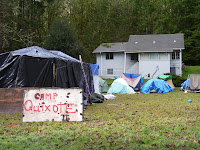
A young man squints against the camera flash.
His long dark hair falls on shoulders hunched beneath an orange jail suit.
He looks uneasy…. His uneasiness is not that of an embarrassing moment or an uncomfortable situation; it is the deep uncertainty that comes when the world falls out from under you.
He flinches against the mug shot.
The next day his face appears on the front page of the local newspaper under the headline: “Rape suspect lived in Watershed. Man appears to have stayed in underground hole.” In the following days, the newspaper prints sensational photos of his underground “bunker”, photos of his belongings strewn about by the police, and short clips – taken out of context – from his private journal.
The article directly above his reads, “Olympia Council tells Tent City to disperse.”
**
A young woman pulls a trash bag, heavy with the weight of two days’ garbage, out of a can and ties the ends. She moves quickly, collecting heaping ashtrays and wiping surfaces in a single motion.
Kandace, 19 years old, is a resident of Camp Quixote, Olympia’s new tent city founded by the Poor People’s Union (PPU). Kandace joined the Union two weeks before Camp Quixote was founded.
“It’s about brainstorming solutions together for poor people to survive in today’s economically challenged world,” she says of the Union, “…about helping people who don’t have other options to have an option. Including myself.”
**
David Lukas Lynch, age 23, was accused of raping an 11 year old girl.
The rape occurred on February 5th. The attacker entered the girl’s home and raped her at knife point while her family slept.
Police found David the next day, huddled in a church parking lot. They asked him if he hurt anyone the night before, and he said, “Yes, I think so.” They arrested him and searched his camp, finding a hunting knife and a journal in which David mentioned his desire to quit “child hunting”.
The Olympian reported later that David was behaving “irrationally” and was so “out of control” that he had to be placed in four point restraints and put on suicide watch. The judge presiding over his case ordered a mental health evaluation to determine if he was capable of standing trial.
**
Kandace grew up in foster care and was left to survive on her own at 18, when she aged out of the program. After bouncing between shelters, camps, and friends’ couches, Kandace discovered the PPU and the plans for a new tent city, which she described as “a doorway to something new, a way to be productive.”
Camp Quixote was erected by the PPU on February 1st. The encampment served as a means for the homeless to establish their right to exist. Having already been squeezed out of the parks, the homeless were frustrated when the City passed an ordinance banning panhandling and sidewalk sitting last November. Camp Quixote was built the day the new ordinance went into effect.
Asked about her opinion of the ordinance, Kandace commented that “the safest place for [homeless women] to be is on the sidewalks where there is light and people around.”
The encampment was initially sited on a vacant City-owned lot at the corner of State and Columbia streets, in the heart of downtown Olympia. Its location made it highly visible. Cars driving by frequently honked their horns in a show of support for the camp residents. Local businesses donated food, and Evergreen students thronged to the site in a show of mass solidarity.
Camp residents checked in regularly with neighboring businesses to make sure they had no complaints. They set up security patrols, and organized volunteers to pick up trash in the neighborhood.
When an elderly, senile woman who had been thrown out of the Salvation Army showed up at the camp, residents took her under wing and made sure she had a good tent and food to eat.
**
David Lynch’s underground camp was impressive. About the size of a fifth-wheel trailer and built with plywood, it even sported a window, and was well hidden from public view.
Sensing a hot story, the Olympian published lavish photos of the camp, calling it an “underground lair” in one “breaking news” update on their website. Readers commented on the Olympian’s website:
“Put him back in the bunker and cover up the hole. Its a good place for someone who rapes an 11 year old.”
“This guy is transient because he is lazy. He is a predator because he is wired wrong.”
“I hope [he] gets repeatedly raped in prison until he has to wear diapers for the rest of his miserable life.”
“Put him in with the rest of the houseless in prison.”
When contacted for a sensational tidbit by the daily Olympian, David’s ex-girlfriend replied, “I want people to understand that he is a brilliant man and a complex thinker and a poet… [David] doesn't have a bad heart."
**
The City of Olympia was unimpressed with the accomplishments of Camp Quixote. Angry about City property being taken over by the homeless, City Manager Steve Hall told the Olympian that “It seems like a terrible way to start a conversation… it seems like a poke in the eye.”
Neither the City Manager nor the Olympian noted the fact that 120 people, mostly members of the PPU, showed up at a November public hearing to express their opposition to the proposed sidewalk ordinance.
After one week at the downtown location, Camp Quixote residents were served with eviction notices from the City.
On Thursday, February 8th, the Board of the Olympia Unitarian Universalist Congregation, sensing the urgency of Camp Quixote’s situation, voted to offer the camp sanctuary on church grounds. Camp Quixote accepted the offer, and the Rev. Art Vaeni contacted the Olympia City Manager to inform him that the camp would be moving to church property the following day.
But the City of Olympia apparently wasn’t satisfied to see the camp move of its own accord. Several dozen armed police officers surrounded and barricaded Camp Quixote in the pre-dawn hours of Friday, February 9th. They threatened that, if the camp was not moved immediately, the residents would be arrested and their belongings seized.
Camp Quixote residents rushed about in the rain to gather their belongings and load them into vehicles supplied by local volunteers, including a truck belonging to T.J. Johnson. T.J. is the only City Council member who has spoken in favor of the encampment.
The tent city is alive and well today, standing on property belonging to the Unitarian Universalist church. The church has offered to let Camp Quixote stay for 90 days. It is likely that another church will step up and offer to host when this 90 day period expires.
But the City of Olympia remains opposed to the existence of the tent city, setting itself at odds with local faith communities, and the Unitarian church faces fines if it fails to comply with the expensive and complicated process of applying for a special use permit.
**
On the morning of February 21st, the following headline appeared in the Olympian: “DNA tests clear rape suspect.”
David Lynch is innocent. He did not commit the crime. Yet he was declared guilty in the court of public opinion. He was sentenced to several weeks locked in the Olympian stocks and pillory, with his life and home splayed out for the world to see and scorn.
Christ once said, “What you do unto the least of these, you do unto me.” If David’s story has one lesson to share, it is that we as a society have failed to end the practice of crucifying our Lord.
The problem isn’t that the cops made a mistake, nor is it that the media was out of line. They made the same assumptions that any reasonable person would make. They found a young, disheveled, confused, mentally ill man who lived in a hole very near to the victim’s home. He possessed hunting knives. He mentioned “child hunting” in his journal. He was homeless. Almost anyone would have found him to be suspicious.
The problem that must be faced, however, is that there was no concrete evidence of David’s guilt. In fact, the little girl who was attacked described her attacker as brown skinned, with short dark hair, a pointed goatee and mustache, and wearing glasses. David is pale, with long shoulder length hair and a clean shaven face. He did not fit the victim’s description of the attacker. David was merely mentally ill and in the wrong neighborhood.
So the problem was not that anyone was out of line… The problem is that sometimes being reasonable can have dramatic and harmful consequences. It was normal, reasonable people whose assumptions led them to burn young women to death for the practice of “witchcraft”. It was normal, reasonable people who endorsed and participated in the Jim Crow system. It was normal, reasonable people who crucified Jesus. And today it is normal, reasonable people who believe that the mentally ill and the homeless are a danger to society.
The truth is that reasonable people are a far greater threat to the homeless than the homeless are to society. And because of this, the homeless are vulnerable when they camp alone. They are not safe from us.
This is why Olympia needs a tent city. So that the homeless can be safe. But there is also a greater need that can be met by Camp Quixote… our very desperate need to find the way to a better life.
Jesus said, “Blessed are the poor.” The homeless do not have many of the worldly comforts that the rest of us enjoy. But God’s Kingdom isn’t about worldly comforts. It is about what we do and who we are. The residents at Camp Quixote take care of one another. The same cannot be said of the rest of our society. All too often we are driven to complacency by our comforts… while our neighbors suffer. All too often we step over the needs of others as we strive to achieve the “American Dream”. All too often we allow our thirst for power and for security to send us into war.
Maybe if we start paying attention to the poor, if we start noticing the way they share their most basic resources like food and blankets, maybe we just might discover what it means to be “blessed”, or holy. And maybe we’ll think twice before we persecute the next David Lynch.
 A young man squints against the camera flash. His long dark hair falls on shoulders hunched beneath an orange jail suit. He looks uneasy…. His uneasiness is not that of an embarrassing moment or an uncomfortable situation; it is the deep uncertainty that comes when the world falls out from under you. He flinches against the mug shot.
A young man squints against the camera flash. His long dark hair falls on shoulders hunched beneath an orange jail suit. He looks uneasy…. His uneasiness is not that of an embarrassing moment or an uncomfortable situation; it is the deep uncertainty that comes when the world falls out from under you. He flinches against the mug shot. 




